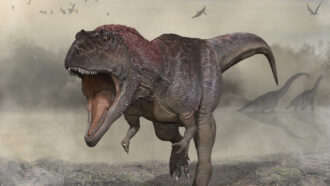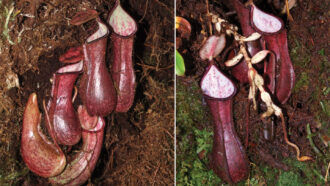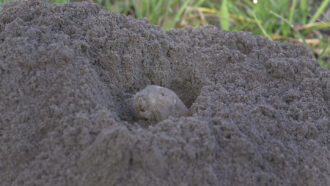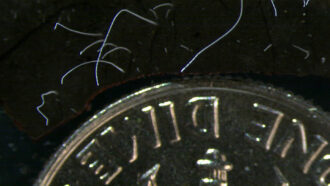All Stories
-
 Psychology
PsychologyScientists Say: Trauma
No one experiences trauma the same way. Its effects can be physical or emotional. Immediate or delayed. Brief or long-lasting.
-
 Animals
AnimalsThe top side of an elephant’s trunk is surprisingly stretchy
Research on elephant trunks could inspire new artificial skins for soft robots.
By Meghan Rosen -
 Fossils
FossilsThis big dino had tiny arms before T. rex made them cool
A predecessor to Tyrannosaurus rex, Meraxes gigas had a giant head. But the muscularity of its puny arms suggests those limbs served some purpose.
-
 Plants
PlantsThis pitcher plant lures insects into underground deathtraps
Scientists didn’t expect the carnivorous, eggplant-shaped pitchers to be sturdy enough to grow embedded in the soil.
By Meghan Rosen -
 Health & Medicine
Health & MedicineSix months in space causes 10 years’ worth of bone loss
Even a year after recovery back on Earth, astronauts who’d been in space six months or more still had bone loss equal to a decade of aging.
By Liz Kruesi -
 Animals
AnimalsGophers might be farmers, a controversial study suggests
Pocket gophers air out and fertilize the soil in a way that amounts to simple farming, two researchers claim. But not everyone agrees.
-
 Chemistry
ChemistryScientists Say: Pigment
From fruits to fur to fine art, many materials get their colors from compounds called pigments.
-
 Fossils
FossilsGreat white sharks may be partly to blame for the end of megalodons
Zinc levels in shark teeth hint that megalodons and great whites competed for food — and great whites won.
-
 Health & Medicine
Health & MedicineTeen arm wrestlers face risk of an unusual elbow break
The pointy part of the inner elbow can break in arm wrestling, especially among teens whose bones are still growing.
By Chris Gorski -
 Microbes
MicrobesThis giant bacterium lives up to its name
The newly discovered Thiomargarita magnifica is about the size of your eyelash and is surprisingly complex.
-
 Science & Society
Science & SocietyLet’s learn about music
Researchers are delving into how instruments and spaces shape our experience of music, and how computers could play a role in the future of music-making.
-
 Physics
PhysicsScientists Say: Proton
These positively charged particles are important building blocks in atoms.